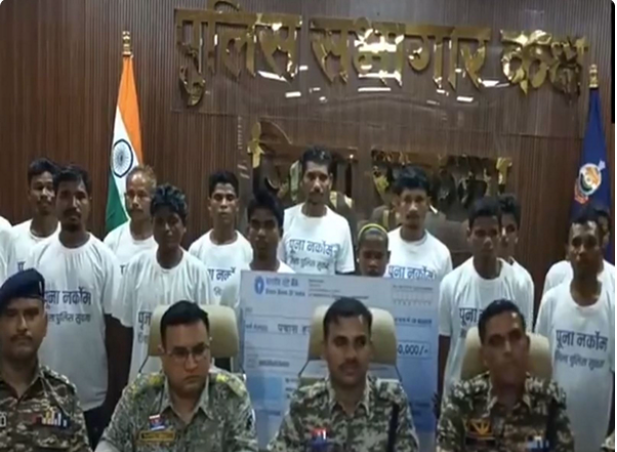

Sukma (Chhattisgarh), May 27: In a major breakthrough for Chhattisgarh's anti-Naxal operations, 18 Naxalites — including four members of the notorious Battalion No. 1 — laid down arms in Sukma district on Tuesday. The surrender was carried out under the influence of the state’s rehabilitation initiative, Niyad Nellanar, officials confirmed.
The development marks a significant boost for peace-building efforts in the violence-hit South Bastar region. Police stated that those who surrendered were previously active in four separate Naxal battalions.
Speaking to the media, Sukma Superintendent of Police Kiran G. Chavan said, “Eighteen Naxals have surrendered under the influence of the ‘Niyad Nellanar’ scheme. Among them, four are associated with Battalion No. 1. This includes operatives from four battalions and several active in South Bastar.”
Chavan assured that all surrendered individuals would be provided with support and benefits under the state government's surrender and rehabilitation policy. “They will be extended all entitlements as per the state schemes. I urge other Naxals to abandon violence and join the mainstream,” he added.
The surrender follows a major security success last week in Narayanpur district, where 27 Naxals — including top CPI (Maoist) leader and General Secretary Nambala Keshav Rao alias Basavaraju — were neutralised by security forces.
Inspector General of Police (Bastar Range) P. Sundarraj revealed that the outlawed CPI (Maoist) outfit had received both training and technological support from various insurgent groups. “Basavaraju was not only the general secretary of the CPI (Maoist) but also led its military commission. He was instrumental in planning violent offensives,” Sundarraj said.
He also noted the involvement of foreign insurgent groups like the LTTE, from whom the Maoists reportedly adopted certain technologies. “This group has consistently targeted security forces using IEDs, ambush tactics, and direct assaults. Their collaboration with outfits like the LTTE shows the extent of their external support,” he said.
With the recent losses in leadership and operational capability, the Maoist group is facing significant setbacks. “Their territorial control has weakened, and their technological edge is eroding. We are hopeful that this marks a turning point towards the end of Naxalism in the region and across the country,” Sundarraj concluded.